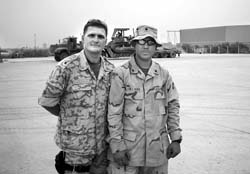What unites our peacemakers with those from Italy and the US are Andriy Shevchenko and the brothers Klychko

No, I was not mistaken: two Solovyans were standing before me. The point is one of them was Ukrainian, the other was American. They met accidentally at Baghdad’s international airport, when our peacekeepers were waiting for a flight from Ukraine.
A BTR-60 armored personnel carrier pulled up next to the filling station, the driver customarily screwed off the tank’s lid and reached out for the fuel hose nozzle. He was then shocked to find... a namesake of his immediate superior’s amiably holding out the hose to him. “Comrade Major, I’ve found you a brother here,” said a baffled Private Makarchuk.
The pump jockey Michael Solovyan, 33, unmarried, hailed from Florida. The guy enlisted in the army four years ago to earn some money along with education privileges. This is all the Ukrainian managed to learn about his overseas namesake during a brief chat. They had a picture taken as a keepsake near our APC.
“I have often rubbed shoulders with other countries’ servicemen stationed in Iraq,” says Volodymyr Solovyan, deputy commander for personnel management of a signals unit. “There are representatives of 23 countries in the multinational Center-South Division. We are doing our service together and accomplishing common missions.
“I, as well as my subordinates, have derived so much benefit in the past six months. We have come to know the foreign military not only as professionals but also as everyday people. The Americans, for example, clearly know and carefully do their duties. They never breach the requirements of manuals, normative documents, or contracts. Even if nobody is watching a GI on duty, he will never seek shelter from rain in a tent or fall asleep. Coming to the canteen, the soldier will always, without any reminders, unload his weapon; he will show up for morning exercises right on the dot.
“Simultaneously, he will never do anything extra. He will draw up a wall newspaper or a fly sheet or remove garbage from around the barracks only if asked to do so. It is also surprising that, having lived together in the same tent for a solid six months, they are indifferent to each other’s life story and mostly address each other by rank and last name. Speaking to us, they are traditionally friendly and open. Smiling perhaps a perfunctory smile, they always take pleasure in showing the photos of their kin, tell about their state, basketball club, and other seemingly unimportant details.
“Impeccable discipline in their units is based on a tough system of fines. If you are late for a lineup, please cough up fifty dollars; if you have drunk some hard stuff, pay 200 bucks out of your salary. They display special piety about weapons. I once saw a private accidentally drop his rifle in the canteen. The sergeant who sat in front of me ordered the culprit, without raising his voice, to do twenty pushups on the floor. After doing this exercise in full gear and in plain view, the soldier reported to his superior and matter-of-factly continued his breakfast.
“Another time a US sergeant didn’t like the way a subordinate of his kept his weapon. I think he failed to clean his M-16 well enough. The ensuing ten-minute telling-off in front of the lined-up soldiers was so thunderous that even I caught some abusive words I know from American movies.
“We have also established a good relationship with the Poles. Incidentally, they spoke to us exclusively in English in the first days and months — ostensibly to meet NATO standards. We have complete mutual understanding with the Mongols, Bulgarians, Rumanians, Hungarians, i.e., with all those who once were part of the socialist camp. The multinational division lives in friendly atmosphere. We try to understand everyone, including those from Honduras, Nicaragua, or the Philippines, and they, accordingly, us. Who knows, perhaps we will have to cover each other tomorrow!
“The Britons are slightly haughty. I don’t think my comment will affect Ukrainian-British relations. They love themselves. They have well-schooled ancillary staff, everything is neat and glossy even in wartime: spic-and- span paths, nameplates, indicator boards, asphalt markings, etc. They’ve got their own bar Oasis with admission by ID cards only.
“What also unites peacekeepers from different contingents is sports. ‘Andriy Shevchenko, Ukraine — Forte!’ the Italians cried out to us. Our soccer player is a visiting card of our state for all those who support Manchester United, Inter, Steaua, and other European clubs. As to the Americans, they know the brothers Klychko better.
“Many servicemen recognize us by our Soviet-period weapons and equipment, for most of them saw our BTR-80 APCs, RPG-7 rocket-propelled grenade launchers, SVD sniper’s rifles, etc., on propaganda posters, manuals, and feature films about the Soviet threat. We allow them to look closely at our firearms and to have picture taken in front of the equipment.
“And, while we may be lagging behind the world’s leading countries as far as modern gear and accouterments are concerned, we by no means do so in terms of professionalism and mastery. Whatever camp the Ukrainians visit, they are always treated with respect.”
Newspaper output №: Section






